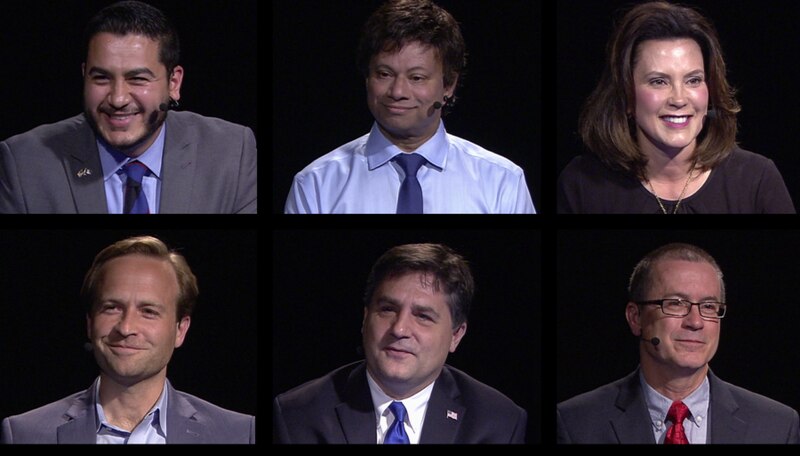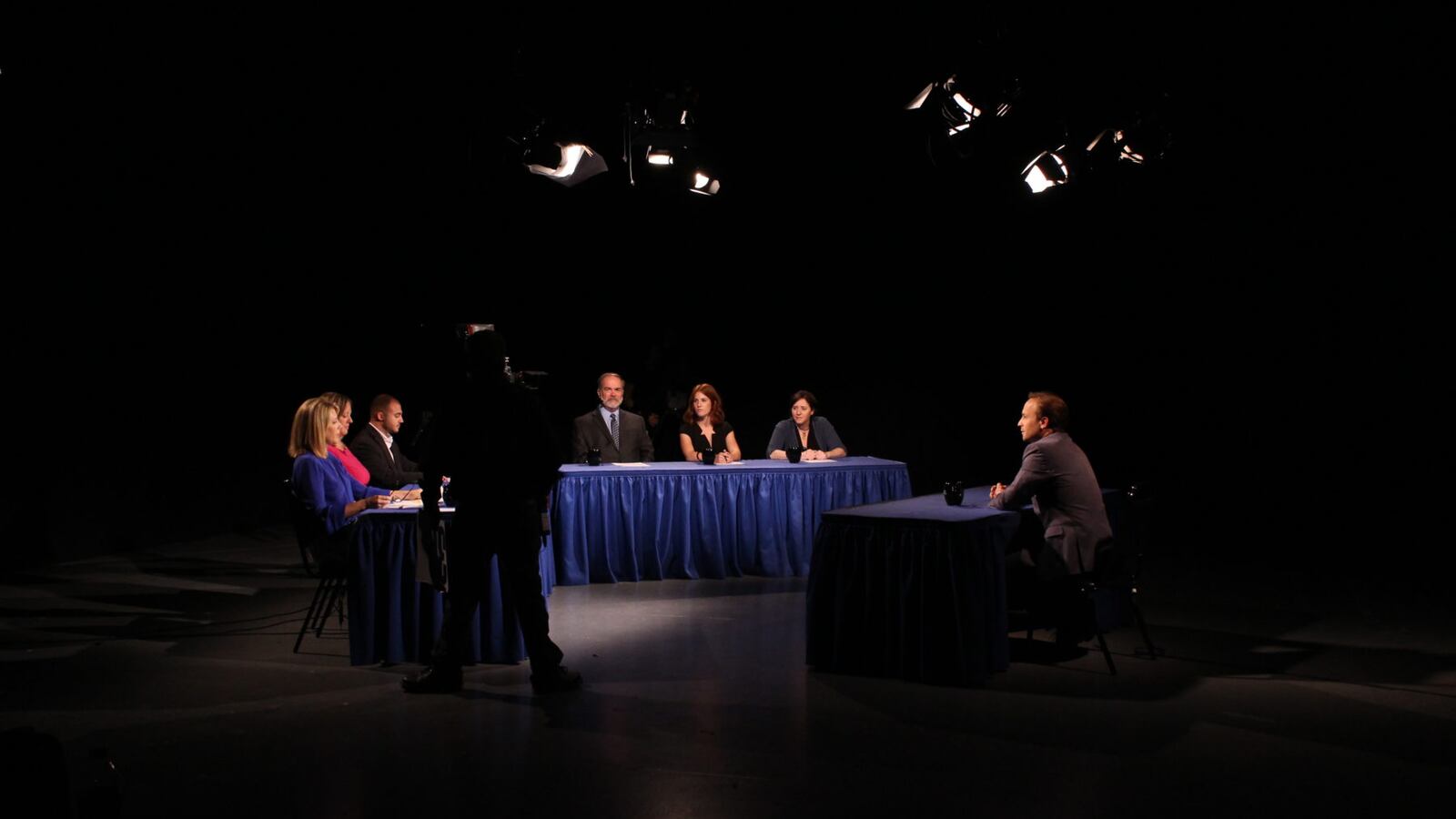The future of Detroit schools is on the line this election cycle, and it starts not with the school board election in November but with Tuesday’s gubernatorial primary.
The next inhabitant of the governor’s mansion will have a hand in school closures and charter policy, and the governor’s cooperation will be needed to avoid a third-grade literacy cliff and a facilities crisis in the state’s largest school district. The next leader of Michigan will decide how to address questions about school funding, charter schools, and early childhood education.
The candidates’ public statements reveal differences even between members of the same party, making clear just how much is at stake for the city’s more than 100,000 school-age children in the election this week.
Voters will have a chance to help one political party pick its nominees for statewide offices when polls open at 7 a.m. on Tuesday. Republican voters will choose between gubernatorial candidates Brian Calley, Bill Schuette, Jim Hines, and Patrick Colbeck. The would-be Democratic nominees are Gretchen Whitmer, Abdul El-Sayed, and Shri Thanedar.
The winner’s education policies will be felt keenly across the state — and especially by families in Detroit.
Dozens of schools — many of them in Detroit — could face closure.
An effort to shutter 38 low-performing schools across the state was taken off the table last year by Gov. Rick Snyder, but the effort could well be revisited by the next governor.
Candidates from both parties have largely avoided tough language about failing schools, instead focusing on providing the resources to help them improve.
“Instead of having a school closing process, why not have a school improvement process that serves as a prevention of the need to close schools in the first place?” asked Calley, the current Lieutenant Governor, in an interview last month with Chalkbeat and other members of the Detroit Journalism Cooperative.. The Democratic candidates have all said they oppose school closures.
Schuette, the Attorney General and presumed GOP frontrunner, stands out for his support of school closures. Last year, his office issued an opinion endorsing the legality of the proposed closures, ratcheting up pressure on Gov. Snyder’s administration as it began to publicly distance itself from the policy.
“Taxpayers deserve a meaningful school accountability system that recognizes return on investment,” he has said.
Thousands of Detroit third-graders will be held back a grade unless there is a change in state law
Michigan is speeding toward a self-imposed literacy cliff. Starting in 2020, schools in the state will be required to hold back third-graders who test below grade level in reading. While policymakers still don’t know exactly what “below grade level” actually means, no one doubts that the impact will be enormous, especially in Detroit.
More than 90 percent of students in the city’s main district would have been forced to repeat a grade were the law in effect last year, a life event with documented emotional repercussions and few clear academic benefits. Disadvantaged students (for example, English language learners) will be most affected.
Critics have called for the 2016 law that created this situation to be repealed or changed, but that would require the cooperation of lawmakers and the signature of the new governor.
Whitmer, a former state legislator who boasts a lead over her Democratic opponents in the polls, said test scores are being used as a “tool of punishment.” By contrast, Schuette re-upped the same concerns about third-grade reading scores cited by the law’s proponents.
The rules could change for charter schools that enroll thousands of Detroit children.
Charter schools have taken a deep hold in Michigan, currently enrolling about 10 percent of the state’s students, but they remain a polarizing issue.
“You’re seeing a drastic difference between the parties when it comes to charter schools,” said Beth DeShone, a spokeswoman for the Great Lakes Education Project, a pro-charter group tied to U.S. Education Secretary Betsy Devos.
All three Democratic candidates have called for more oversight over charter schools, with two calling for the elimination of for-profit schools.
By contrast, Republican candidates uniformly promise to preserve the state’s 1993 charter school law, framing their proposals in the language of “school choice” used by charter advocates.
If Detroit is going to pay its urgent $500 million facilities bill, it will need cooperation in Lansing.
Many of the buildings in Michigan’s largest school district are in a state of serious disrepair. Fixing them will cost millions, and the district doesn’t just lack the money to pay for renovations — it is legally barred from asking voters to raise taxes as every other district in the state can do.
Legislative action in Lansing figures prominently on a list of possible solutions to the district’s facilities crisis. The 2016 state law that helped the district avoid bankruptcy also put strict limitations on its ability to take on new debt, limitations that district leaders would like to see lifted, at least for the most pressing repairs.
But that would take the governor’s cooperation, and while most candidates have said they would be willing to help find solutions, some expressed reluctance.
“It seems prudent for the state to exercise caution about allowing the district to take on new debt,” Schuette said.
Republican Jim Hines was more blunt: “They’re going to have to figure that out on their own.”
Experts agree that Michigan’s school funding system is badly out of date. The impact of a change would be felt disproportionately in Detroit.
Michigan’s system for funding schools is simple — too simple, according to a growing chorus of experts. Since the 1990s, schools have been funded almost completely on a per pupil basis, with almost nothing extra going to rural districts and districts that enroll lots of poor students or language learners (like Detroit).
“We have been essentially pounding the same square peg into a round hole,” said Steve Wasko of the School Finance Research Collaborative, a non-partisan group of Michigan educators.
Earlier this year, the Collaborative released a detailed study of the way schools spend money in Michigan. Its conclusion: whether or not the state is spending enough money on education, it is spending its education dollars the wrong way.
In interviews, the Democratic candidates have spoken up for a system that routes extra funding to districts with more needy students. El-Sayed has called the current system “deeply inequitable.”
Calley, who commissioned a study that found a $700 million hole in special education funding, has argued that extra money should go specifically to children with special needs, while Hines wants a funding increase to schools in the rural northern part of the state.
Schuette and Colbeck have said that, generally speaking, funding for schools does not need to be increased.
Advocates worry early childhood education could be ‘deemphasized.’
In 2014, a $130 million expansion of early childhood education gave 20,000 additional Michigan children access to pre-K programming.
The state still has a long way to go, especially in its programs for 3- and 4-year-olds. “We don’t have enough care as it is, and the quality of that care really needs to be increased across the board,” said Denise Smith, executive director of Educare, an early childhood school in Flint.
But the election on Tuesday could slow that momentum.
“There could be a de-emphasis on early childhood depending on who gets the win,” Smith said.
A ream of research point to the long-term benefits of early education programs like Head Start, but questions about the issue drew a wide range of responses from candidates when asked about it by Chalkbeat and the DJC in recent interviews. Some said early childhood education should be dramatically expanded (El-Sayed, Thanedar), some saying the current system can be improved (Whitmer and Calley), and others (Republicans minus Calley) saying it should be moved lower on the state’s list of education priorities.
The latter category includes Schuette, who said there are “important questions about the efficacy of preschool,” pointing to a study in Tennessee that suggests that the benefits of pre-K fade around the third grade.
Colbeck, meanwhile, argued that the issue has nothing to do with education. “If you’ve got a dad that’s working, mom can stay home and take care of the kids,” he said.


